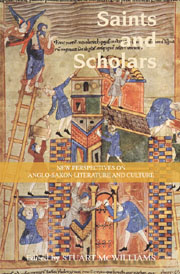 Saints and Scholars
Saints and Scholars Introduction
Published online by Cambridge University Press: 05 February 2013
Summary
If Old English is truly ‘old’, then no one told Hugh Magennis. After all, Hugh's highly distinguished career has been built on a conviction – clearly evinced in his research and teaching – that Old English has never lost its vitality. I was fortunate enough to absorb this notion from Hugh as an undergraduate at Queen'sUniversity, Belfast, where he taught Anglo-Saxon literature and culture alongside Ivan Herbison for many years, and I subsequently benefited from his careful and generous supervision during my doctoral degree. These experiences, together with the research Hugh has presented in his many seminars and publications, have demonstrated to me that Old English texts are not merely an ‘origin’ – they percolate relentlessly through the history of literature.
Michael Alexander quipped in his 1973 verse translation of Beowulf that the poem, and perhaps metonymically the whole of Old English, has been ‘mounted as a sort of a dinosaur in the entrance hall of English Literature’. Hugh has challenged this preconception in two ways. First, he has worked to raise the profile of other aspects of Anglo-Saxon literature and culture, including the hagiographic tradition, and to illuminate the often complex textual histories of works which either escape the canon of heroic poetry, or interact with it in surprising ways. Second, his own dealings with the dinosaur – beginning early in his career and culminating in the recent and much-praised monograph Translating Beowulf: Modern Versions in English Verse – have increasingly emphasised survival over fossilisation.
- Type
- Chapter
- Information
- Saints and ScholarsNew Perspectives on Anglo-Saxon Literature and Culture in Honour of Hugh Magennis, pp. 1 - 4Publisher: Boydell & BrewerPrint publication year: 2012


